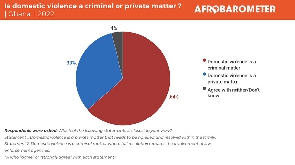A majority of Ghanaians say it is never justified for a man to physically discipline his wife, the latest Afrobarometer survey shows. While most citizens say that violence against women and girls is uncommon in their communities, many also say women are likely to be criticized or harassed if they report gender-based violence to the authorities. Overall, Ghanaians consider domestic violence to be a criminal matter requiring the involvement of law enforcement, rather than a private matter to be resolved within the family. Most believe that the police are likely to take cases of GBV seriously. Key findings 1. More than three-fourths (78%) of Ghanaians say violence against women is “not very common” or “not at all common” in their community. One in five citizens (21%) disagree (Figure 1). 2. Most Ghanaians (85%) say it is “never” justified for a man to physically discipline his wife. About one in seven think it is “sometimes” (11%) or “always” (3%) justified (Figure 2). 3. More than four in 10 respondents consider it “somewhat likely” (24%) or “very likely” (18%) that a woman will be criticized or harassed if she reports gender-based 4. violence against the authorities. Only one-third (35%) say this is “very unlikely” (Figure 3). But almost nine out of 10 respondents (86%) believe that the police are likely to take cases of GBV seriously (Figure 4). 5. Almost two-thirds (64%) of Ghanaians say domestic violence should be treated as a criminal matter rather than as a private matter to be resolved within the family (Figure 5). Afrobarometer surveys Afrobarometer is a pan-African, non-partisan survey research network that provides reliable data on African experiences and evaluations of democracy, governance, and quality of life. Eight survey rounds in up to 39 countries have been completed since 1999. Round 9 surveys (2021/2022) are currently underway. Afrobarometer’s national partners conduct face-to-face interviews in the language of the respondent’s choice. The Afrobarometer team in Ghana, led by the Ghana Center for Democratic Development, interviewed a nationally representative sample of 2,400 adult Ghanaians in April 2022. A sample of this size yields country-level results with a margin of error of +/-2 percentage points at a 95% confidence level. Previous surveys were conducted in Ghana in 1999, 2002, 2005, 2008, 2012, 2014, 2017, and 2019. Respondents were asked: In this area, how common do you think it is for men to use violence against women and girls in the home or the community? Figure 2: Is it justified for men to physically discipline their wives? | by gender | Ghana | 2022 Respondents were asked: For each of the following actions, please tell me whether you think it can always be justified, sometimes be justified, or never be justified: For a man to use physical discipline on his wife if she has done something he doesn’t like or thinks is wrong? Figure 3: Will a woman be criticized, harassed, or shamed for reporting GBV? | by gender | Ghana | 2022 Respondents were asked: If a woman in your community goes to the police to report being a victim of gender-based violence, for example, to report a rape or report being physically abused by her husband, how likely or unlikely is it that the following things might occur: She will be criticized, harassed, or shamed by others in the community? Figure 4: Do police take GBV cases seriously? | Ghana | 2022 Respondents were asked: If a woman in your community goes to the police to report being a victim of gender-based violence, for example, to report a rape or report being physically abused by her husband, how likely or unlikely is it that the following things might occur: Her case will be taken seriously by the police? Figure 5: Is domestic violence a criminal or private matter? Respondents were asked: Which of the following statements is closest to your view? Statement 1: Domestic violence is a private matter that needs to be handled and resolved within the family. Statement 2: Domestic violence is a criminal matter whose full resolution requires the involvement of law enforcement agencies. (% who “agree” or “strongly agree” with each statement) For more information, please contact: Ghana Center for Democratic Development Maame Akua Amoah Twum Telephone: +233 (0) 208326343 Email: maameakua@afrobarometer.org Visit us online at: www.cddgh.org www.afrobarometer.org Follow our releases on #VoicesAfrica.

















